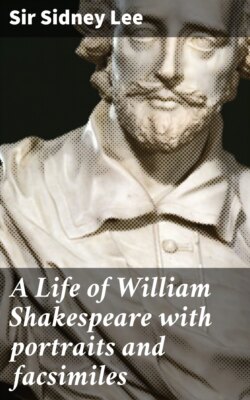Читать книгу A Life of William Shakespeare with portraits and facsimiles - Sir Sidney Lee - Страница 18
На сайте Литреса книга снята с продажи.
The poet’s classical equipment.
ОглавлениеTable of Contents
With the Latin and French languages, indeed, and with many Latin poets of the school curriculum, Shakespeare in his writings openly acknowledged his acquaintance. In ‘Henry V’ the dialogue in many scenes is carried on in French, which is grammatically accurate if not idiomatic. In the mouth of his schoolmasters, Holofernes in ‘Love’s Labour’s Lost’ and Sir Hugh Evans in ‘Merry Wives of Windsor,’ Shakespeare placed Latin phrases drawn directly from Lily’s grammar, from the ‘Sententiæ Pueriles,’ and from ‘the good old Mantuan.’ The influence of Ovid, especially the ‘Metamorphoses,’ was apparent throughout his earliest literary work, both poetic and dramatic, and is discernible in the ‘Tempest,’ his latest play (v. i. 33 seq.) In the Bodleian Library there is a copy of the Aldine edition of Ovid’s ‘Metamorphoses’ (1502), and on the title is the signature Wm. She., which experts have declared—not quite conclusively—to be a genuine autograph of the poet. [15] Ovid’s Latin text was certainly not unfamiliar to him, but his closest adaptations of Ovid’s ‘Metamorphoses’ often reflect the phraseology of the popular English version by Arthur Golding, of which some seven editions were issued between 1565 and 1597. From Plautus Shakespeare drew the plot of the ‘Comedy of Errors,’ but it is just possible that Plautus’s comedies, too, were accessible in English. Shakespeare had no title to rank as a classical scholar, and he did not disdain a liberal use of translations. His lack of exact scholarship fully accounts for the ‘small Latin and less Greek’ with which he was credited by his scholarly friend, Ben Jonson. But Aubrey’s report that ‘he understood Latin pretty well’ need not be contested, and his knowledge of French may be estimated to have equalled his knowledge of Latin, while he doubtless possessed just sufficient acquaintance with Italian to enable him to discern the drift of an Italian poem or novel. [16]
